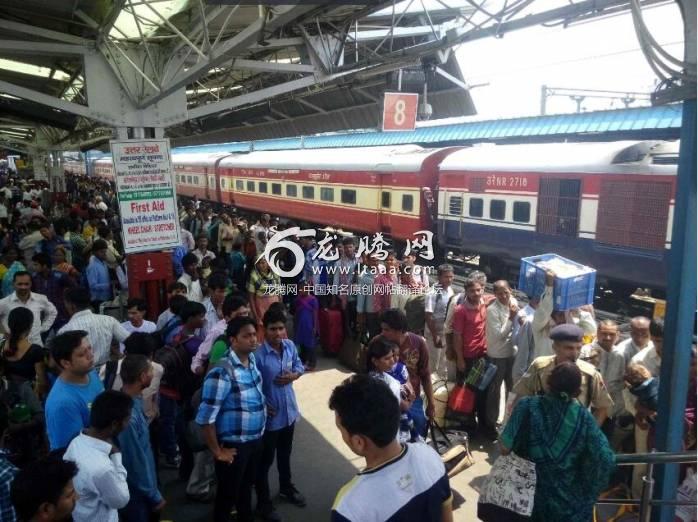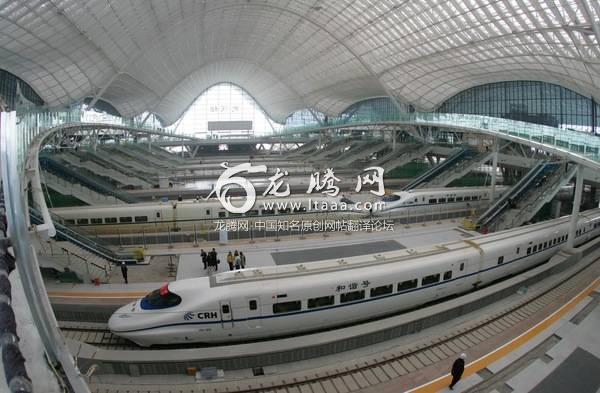为什么印度不像中国那样进步? [美国媒体]
quora网友:在中国搭乘高铁旅行时,我们甚至没注意到车在车站停下或再次提速。我们国内何时能有这样的奢侈?想一下,什么让印度面临困境?为何印度仅仅要修一条高铁,就出现那么多反对声呢?而中国几乎有百辆高铁齐头并进......
Does China have railways?
中国有铁路吗?
Subhash Chandra Sawhney, former Senior Manager (Management Services) at Scooters India Ltd., (1973-1992)
Just have a look at the following two pictures – one of a railway station of a second tier city of India and another of a second tier city of China.
看两张照片,印度第二大城市和中国第二大城市的火车站。
While travelling by a bullet train in China we don’t even notice when the train may have stopped at a station or may have picked up speed again, how long shall it take us to have such a luxury here in our country? Is it not time we got over to live more gracefully in our country than we have been living all through, so far?
在中国搭乘高铁旅行时,我们甚至没注意到车在车站停下或再次提速。我们国内何时能有这样的奢侈?
Just think, what may be ailing India?
Why there is so much of opposition in our country to have even a single bullet train track in our country while almost a hundred bullet trains run side by side in China as shown in the above image?
It is time to retrospect and do something to set the country on the right track that may help us to get out of the smog that surrounds us.
What is bogging us down?
Why have we been left that far behind the rest of the world except in the field of launching satellites?
Here are some of the reasons.
想一下,什么让印度面临困境?
为何印度仅仅要修一条高铁,就出现那么多反对声呢?而中国几乎有百辆高铁齐头并进,就像上图那样。
是时候回顾一下,想办法让国家走上正确轨道,帮助我们拨开周围的烟雾。是什么让我们陷入了困境?除了发射卫星外,为何我们落后世界其他国家那么多?
这儿有一些原因。
DEMOCRATIC SET UP
Way back during my childhood one of our family friends had shared his mind with me in the following words, “Anybody who wishes to please everyone would end up pleasing none – whosoever.”
We have lived up with democracy for about seventy years by now in our country, which is long enough of time to ponder over the pros and cons of democracy by looking back how it has benefitted us or how it has hurt us on our back.
In democracy, we aim to accommodate all sorts of communities and all sorts of cultures in our social fabric – to name a few, for instance, Muslims, Hindus, Christians, Sikhs, Jains and Budhists.
【民主建立】
孩提时期,我家人的朋友和我分享他的想法:“希望取悦任何人的人,最终取悦不了任何人。”
我们国家至今已经经历了70年的民主,是足够长的时间让我们思考民主的利弊了,看看它如何带给我们好处,或如何伤害我们。
民主中,我们的目标是在社会结构中容纳各种群体和各种文化,例如,穆斯林、印度教、基督教、锡克教、耆那教和佛教。
It is like preparing a recipe using all the ingredients – all sort of corns, all sorts of condiments, all sorts of flours, all sorts of vegetables, all sorts of fruits, all sorts of wines and liquors, all sorts of meats – pork, beef, mutton, poultries, fishes and what not – all in the same dish.
Just imagine what you may dish out on the table toward the end.
In democracy, you can’t move a step without garnering consensus of all.
Do you think we can ever garner consensus of all the communities on any issue?
It is decidedly an uphill task to garner consensus of all the communities on any issue all the time – be it demonetisation of 500 rupee and 1000 rupee currency notes or the construction of a temple at Ayodhya or imposition of ban of sale of bovines to the slaughter houses or whatsoever.
So the prerequisite of garnering consensus of all the communities works as a big bugbear to take any step in a democratic set up.
就像准备一道用所有原料的菜——各种玉米、各种调料、各种面粉、各种蔬菜、各种水果、各种酒和葡萄、各种肉(猪肉、牛肉、羊肉、家禽肉、鱼肉等等),都放在同一道菜里。
想象一下最终你桌上会摆上什么菜。
民主国家中,在没达成共识前,你不能迈出一步。你认为我们能在任何问题上达成共识吗?
无时无刻地获得所有群体的在任何问题上的共识,这明显是个艰巨的任务——无论是500/1000流通卢比的废除,还是在阿约提亚建设一间寺院,还是禁止向屠宰场出售牛等。
所以,在民主建设中,在所有工作中获得所有群体的共识是采取任何步骤中最麻烦的。
OUR CHARACTERISTIC MENTALITY
Can we contribute the slow pace at which we are able to push ourselves through the struggles of life to only our basic mentality?
To some extent, yes!
We witnessed one of the most common characteristics recently during demonetization.
We sacrifice the national interest but do not sacrifice our personal interest. Just see what happened during demonetisation. Many bank officials colluded with the people who offered them hefty share if they exchanged their black money with the new currency notes across the country. No wonder, they hijacked the scheme.
【我们的心理特征】
通过生活的挣扎推动我们自己的这一缓慢速度能促成我们的基本心态吗?某种程度上,能。
在最近的废钞令期间,我们目睹了最普遍的特征之一。单看废钞令期间,我们牺牲国家利益,但不能牺牲个人利益。
THE CONCEPT OF FOUR TYPES OF VARNAS IN THE COMMUNITY
The concept of four Varnas is proving too heavy on the minds of the Indians. According to this classification, the Shudras, who have been working as scavengers form the lowest rung of the society. Everybody thinks that to clean things is a work of Shudras. So nobody wants to belong to this rung of the society. As such we are shy of cleaning things with our own hands. This is the main reason why we see dirt and squalor squandered all around us everywhere – on the streets, on the roads, on the trains, and practically everywhere. We do not take pride in keeping our things clean by ourselves. We want the lower class of community to do the cleaning-job. But with the passage of time even the lower class has become aware of this classification and it no more wants to wear the badge of Shudras anymore. So we are hamstrung. We find squalor strewn all around us – wherever we go.
This is working as a big taboo that is abnegating the Swachhta Abhiyan (Cleanliness Drive) of the Prime Minister.
【社会上4种姓概念】
四种种姓扎根于印度人的思想中。根据分类,首陀罗,一直像食腐动物一样工作,形成社会最底层。每个人都认为,清洁工作是首陀罗做的,所以没人想成为社会的这一阶层。同样,我们羞于用自己的手清洗东西。这就是为何我们到处都能看见污浊、肮脏、浪费的主要原因——在街上、火车上、几乎任何地方。
我们不以自己清洁自己的东西为荣。我们想要社会更低阶层的人来做清洁工作。但随着时间的推移,即使是社会更底层也意识到这种分类,再也不想带上首陀罗的标志了。所以我们残废了,我们去哪儿都发现周围到处肮脏。
总理的“清洁印度”正作为大禁忌被放弃。
TOO MANY POLITICAL PARTIES FUNCTIONING IN THE COUNTRY
Another reason is, we have too many political parties in our country no other country may perhaps boast to have.
The political parties spend lots of money to show down the ruling parties. They work more or less like the cockroaches someone had described in a joke long back – the joke which described why none of the Indian cockroaches won in a competition because every cockroach kept on pulling back the cockroach which was about to reach the rim of the pot they were supposed to climb in order to win.
【国内有太多政党】
另一个原因是,我们国家有太多政党,没有其他国家会自吹有多少政党的。
政党花了大量的钱竞争执政党,他们的工作或多或少像过去某人在笑话中形容的蟑螂一样——笑话描述了为何印度的蟑螂没一个赢得比赛的,因为每一只蟑螂都努力把那只爬到锅边要赢的蟑螂拉回来。
How long shall we linger on like this?
On whom, lies the onus of bringing in the necessary change – social, political or whatsoever that may take our country out of stupor as soon as possible?
Why can’t we also match with any of the other fast progressing-countries?
It is time we retrospect and awaken well in time before it gets too late.
我们还要这样多久?
谁会带来社会、政治或任何东西的必要改变,让我们国家尽快摆脱困境?为何我们也比不上其他快速发展的国家?
趁还来得及,是时候及时回头醒悟了。
Deepak Dwivedi, A Logical Indian
Because India choose liberty over prosperity.
To make The Communist Model of Growth successful, Party deprived Chinese people with their right of Liberty. Although they got economic prosperity in return.
Here the question arises, Do they feel happy to trade their Liberty with Prosperity or not?
It’s an individual choice. But, as an individual I will always prefer Liberty over Prosperity.
因为印度选择自由而不是繁荣。
为了让共产主义增长模式成功,党剥夺了人民的自由,换来的是经济繁荣。
问题来了,他们是否愿意用自由换取繁荣呢?这是个个人选择,但作为个人,我更愿意选择自由而不是繁荣。
Abhinav Kumar,B.Tech Computer Scinece Engineering,SBSSTC(2019)
I’m an Indian and I too belive that India is not developing as fast as china because unlike china, India is a diversified nation in every aspect. From culture to food and festivals. In India, where now it seems that the average age is around 26 that is quite young. So why is that India still lacking in terms of development.
我是印度人,我也认为印度的发展速度没有中国快,因为与中国不同,从文化到美食和节日,印度在各个方面都是一个多元化的国家。在印度,平均年龄在26岁左右,这是相当年轻的。那么,为什么印度仍然缺乏发展呢。
I belive the biggest reason is the unemployment. There are on average arount 2.5 lakh students completes their secondary education and moves to colleges for brighter future. most of the student’s work hard and excel in their respective feilds. But on completion of their undergraduation/graduation degree they failed to find suitable job oppurtunity because of which they opt to move out of the country and because of which the India is not developing as fast as china. people in china always stays in china(well not everyone but most of them) but in India this dosent happen.
我认为最大的原因是失业。 平均每年有25万名学生完成中学教育,并为了光明的未来进入大学学习。 大多数学生努力学习并且在各自的领域中表现出色。 但是,在他们的本科/毕业学位完成后,他们没有找到合适的工作机会,因此他们选择离开这个国家,而中国人总是留在中国(不是每个人,但大多数人),这导致印度不如中国的发展。
If this “Brain Drain” stops, the energy and resources the country has provided dosent go in vain and if we recognise that, work for the development of our country then I belive that India will be also one of the developed nation.
如果此类“人才流失”停止了,国家所提供的能源和资源才不会徒劳无功,如果我们认识到这一点,为我们国家的发展而努力,那么我相信印度也将是发达国家之一。
版权声明
我们致力于传递世界各地老百姓最真实、最直接、最详尽的对中国的看法
【版权与免责声明】如发现内容存在版权问题,烦请提供相关信息发邮件,
我们将及时沟通与处理。本站内容除非来源注明五毛网,否则均为网友转载,涉及言论、版权与本站无关。
本文仅代表作者观点,不代表本站立场。
本文来自网络,如有侵权及时联系本网站。
图文文章RECOMMEND
热门文章HOT NEWS
-
1
Why do most people who have a positive view of China have been to ...
- 2
- 3
- 4
- 5
- 6
- 7
- 8
- 9
- 10
推荐文章HOT NEWS
-
1
Why do most people who have a positive view of China have been to ...
- 2
- 3
- 4
- 5
- 6
- 7
- 8
- 9
- 10












